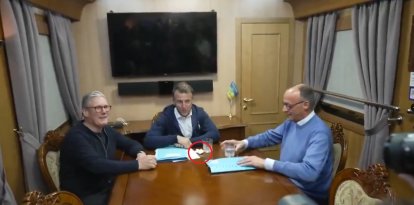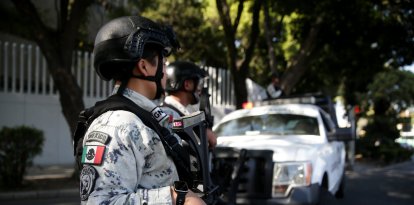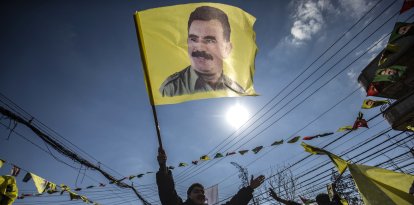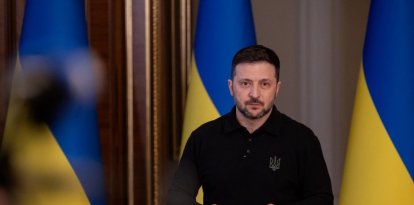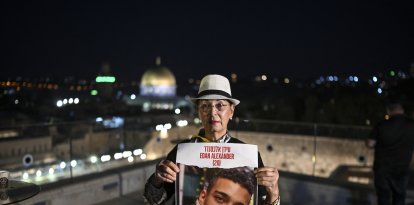Can Javier Milei pull off a first-round win? What you need to know about the elections in Argentina
The libertarian economist appears first in the polls while Sergio Massa and Patricia Bullrich compete for second place.
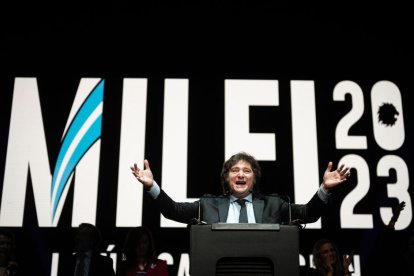
El candidato presidencial Javier Milei (Cordon Press)
Argentina will elect a new president on Sunday, October 22, and all eyes are on Javier Milei. The libertarian economist was the candidate with the most votes in the primary elections and now has his sights set on increasing his number of votes to avoid a second round. His direct rivals, the Peronist Sergio Massa and the center-right Patricia Bullrich, are fighting for second place, hoping to provoke another vote in November.
In August, the Open, Simultaneous and Mandatory primaries (PASO) took place, in which voters chose the candidates who go to the general elections. Although they do not define anything, they are seen as the most accurate survey for October. On that occasion, following Vice President Cristina Kirchner's prediction, Milei surprised everyone and took first place, obtaining 29% of the votes.
Bullrich, the candidate of former president Mauricio Macri's party, was very close. The former security minister defeated Horacio Rodríguez Larreta internally, and her party (Together for Change) totaled 28% of the votes, adding what was obtained by the two competitors. The podium was completed by Sergio Massa, with the worst election in the history of Peronism, with 27% of the votes. The current Minister of Economy has already said that "a friendly match is not played more than an official one," implying that he will exploit the famous "Peronist apparatus" to the maximum for these elections.
Contrary to what pollsters predicted, Kirchner had said months ago that it would be an election of thirds, where "the ceiling" did not matter, but rather "the floor" since this defines who enters and who does not enter a potential second round.
How do you vote in Argentina?
The South American country has the following electoral system: first comes the aforementioned PASO elections, where candidates must pass 1.5% to advance to the general elections (October 22). Once there, there are two ways to win in the first round: obtaining more than 45% of the votes or reaching 40% with a difference of more than ten percentage points with the immediate pursuer. In either of these two scenarios, whoever leads becomes the president-elect.
If this doesn't occur, which is the most likely scenario, the two candidates with the most votes will face each other in a second round scheduled for November 19.
Milei wants to claim victory on Sunday
The economist was enthusiastic at the closing of his campaign at the Movistar Arena in Buenos Aires, where he entered like a rock star. He arrived on stage after winding his way through his supporters and then was encouraged to recite a part of his signature song, Panic Show. The objective for Sunday is clear: avoid a second round. The goal is not an easy one, given that Milei would have to rise 11 points compared to the August elections, but it is something that La Libertad Avanza (Liberty Advances), his political party, does not see as impossible.
His campaign has two scenarios to exceed 40% of the votes: capture a majority among those who did not vote in August and improve voting oversight. Regarding the first point, participation in the primaries was 69%, and political analysts estimate it will be 75% on Sunday. Milei's campaign estimates that three out of every four new voters will vote for him, potentially boosting his numbers nationwide.
The second scenario has to do with increasing the number of electoral overseers who defend their votes. In Argentina, it is very common for each political party to provide its own officials at each voting station to guarantee that no ballot accidentally escapes from the ballot box. To do this, he plans to go from the 30,000 overseers he had in the primaries to 100,000, thus ensuring that their votes are well taken care of.
The race for second place: Bullrich and Massa
Keeping Kirchner's premonition in mind, the key to the elections will be on the "floor," that is, the most important thing in order to enter a more than likely second round with Milei will be that the other candidates can't have too low of numbers. This is precisely where Sergio Massa and Patricia Bullrich currently coexist, but it turns out that there is only one place available.
At least in the run-up, the Peronist seems to have more room to grow than Macri's candidate. It turns out that Peronism has a habit of improving its performance between the primaries and the general elections, especially in the north of the country and in the Province of Buenos Aires, the mother of all battles. It is the most populated district in the country and a Peronist bastion that they have only lost twice since the return of democracy in 1983.
In addition, the charismatic Minister of Economy carried out what is locally known as the "platita plan," which means quickly pushing through a series of beneficial measures in the short term for the middle and lower class. As a representative of the current government, in his electoral burden he has a country with more than 100% year-on-year inflation, a sharp drop in purchasing power and a dollar that has already passed the 1,000 peso barrier.
José (Pepe) Mujica, former president of Uruguay, analyzed the elections in Argentina and expressed the following about Massa: "Argentina is an indecipherable thing. It is a country that has a mythology. How can you explain that the economy minister, with a rate of inflation like Argentina has, is going to vy for the presidency? Do you know why? Because he has the support of one thing, which does not agree with him but is going to vote for him, and it is called Peronism. That animal exists and is a mythology that the Argentine people have."
On the other hand, Patricia Bullrich's strategy is a little different. In the last weeks of the campaign, she has focused on winning the most moderate and center-left votes, in other words, the votes Rodríguez Larreta obtained in the primaries. Although they represent the same political party, the voter of the mayor of Buenos Aires is not the closest to Bullrich in terms of ideology. To remedy this situation, her campaign announced that Rodríguez Larreta would be the chief of staff if she reached the Casa Rosada.
Bullrich will also seek to improve her performance in the center of the country, specifically in Mendoza, Entre Ríos, Santa Fe and Córdoba, where Milei became unexpectedly strong. For example, although three of the four provinces have or will have governors from Together for Change, they voted for Milei in August.
What do the polls say?
This question loses a bit of clout given the first-round scenario, where no pollster guessed the result, much less who came in first place. However, it never hurts to review the latest polls, which, according to local law, must be published days before the election.
On average, Milei leads with a voting intention of 33.4%. In addition, his candidacy has a minimum of 27.88% and a maximum of 38.84%, in the latter case achieving a victory in the first round.
Second place would go to Massa, who would then enter a second round with the libertarian. His average is 29.2%, with a minimum of 24.88% and a maximum of 33.62%.
In third place is Bullrich, averaging 24.7% of the voting intention, with an optimistic scenario of 28.8% and a more pessimistic one of 20.54%.
RECOMMENDATION
